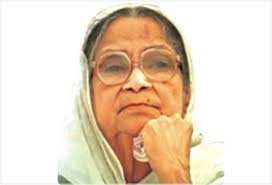
DHAKA, June 19, 2021 (BSS) - The 110th birth anniversary of poet Sufia
Kamal will be observed tomorrow.
A pioneer in movement for women emancipation, Sufia Kamal was born on
June 20, 1911 in Shayestabad Nawab family in Barisal.
During her childhood, women's education was prohibited and she could not
afford to get academic education.
Nevertheless, she learned Bengali, Hindi, Urdu and Arabic languages at
home.
In 1918, she went to Kolkata with her mother where she came to meet with
Begum Rokeya.
She was first married at the age of 11 to her cousin Syed Nehal Hossain
who was a law student.
They had a daughter, Amena Kahar.
Hossain died in 1932. Five years later, Sufia married Kamaluddin Ahmed.
Kamal later had two other daughters, Sultana Kamal and Saida Kamal, and
two sons Shahed Kamal and Sajed Kamal.
In 1925, Kamal met Mahatma Gandhi, who inspired her to wear simple
clothing.
Kamal's first poem, Bashanti (Of Spring), was published in Saogat
magazine in 1926. In 1931, she became the first Bengali Muslim female to be a
member of the Indian Women Federation.
A short story Shainik Bodhu which Kamal wrote was published in a local
paper in 1923.
In 1937, she published her first collection of short stories, Keyar
Kanta (Thorns of the Keya Tree).
Her literary career took off after her first poetry publication. Her
first book of poems, Sanjher Maya (Evening Enchantment), came out in 1938,
bearing a foreword from Kazi Nazrul Islam and attracting praise from
Rabindranath Tagore.
In 1947, Kamal became the founding editor of the Begum, a weekly
magazine specialized on women's issues which was published by Mohammad
Nasiruddin.
In October of that year after the partition of India she came to Dhaka.
During a huge clash between Hindu and Muslim of that time Kamal worked for
their friendship and joined in peace committee.
In 1948, when Purbo Pakistan Mohila Committee formed, she became its
chairman.
Kamal's activism continued in 1952, with the Language Movement. In 1961,
when the Pakistani government banned Rabindra Sangeet (Songs of Rabindranath
Tagore), she became involved in the movement among Bengalis that ensued in
1961.
During the mass uprising in 1969, which demanded the resignation of
Pakistani military general Ayub Khan, she promoted the cause by forming
Mohila Sangram Parishad (Women's Struggle Group).
In later life, she made women's rights her top priority and headed
Bangladesh's largest women's organisation, Mahila Parishad, for many years.
She did not see the oppression of women as solely a class issue. She was
also the first Chairperson of BRAC (1972-1980).
Kamal was instrumental in getting the first women's dormitory of Dhaka
University to be named Rokeya Hall, after Begum Rokeya.
She died in 1999 and was the first woman to be given a state funeral in
Bangladesh.